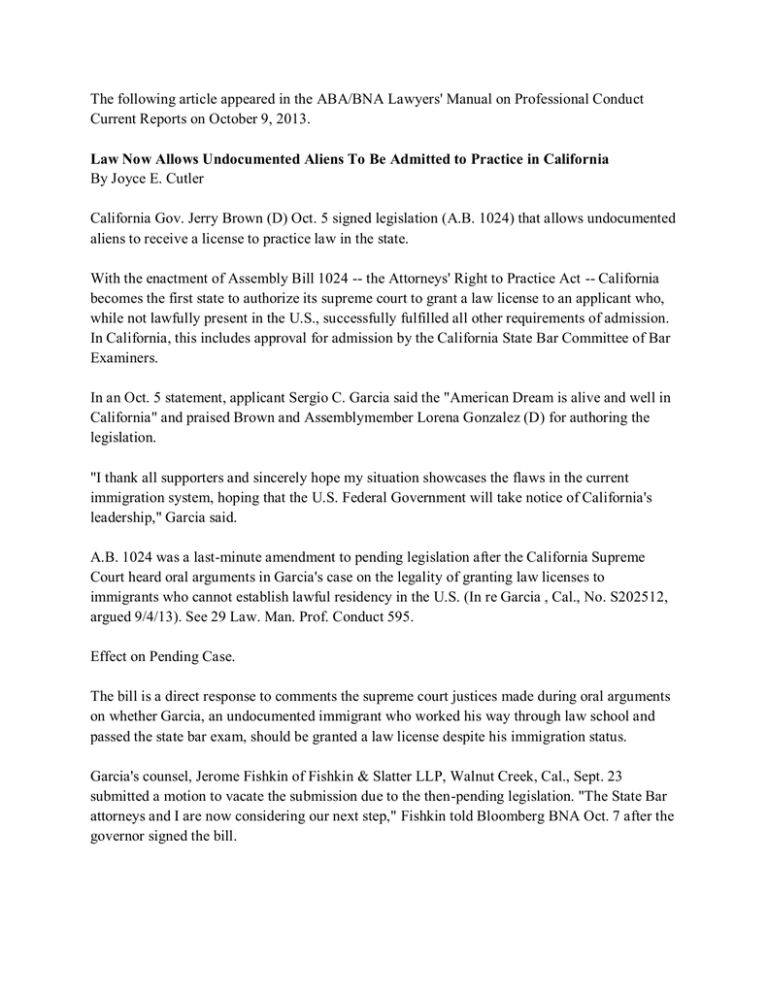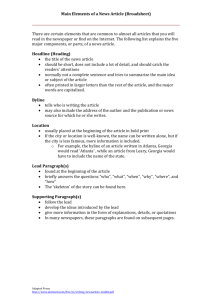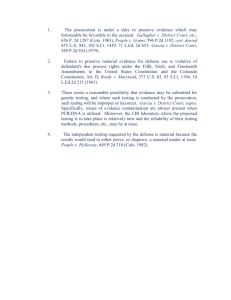The following article appeared in the ABA/BNA Lawyers' Manual on... Current Reports on October 9, 2013.
advertisement

The following article appeared in the ABA/BNA Lawyers' Manual on Professional Conduct Current Reports on October 9, 2013. Law Now Allows Undocumented Aliens To Be Admitted to Practice in California By Joyce E. Cutler California Gov. Jerry Brown (D) Oct. 5 signed legislation (A.B. 1024) that allows undocumented aliens to receive a license to practice law in the state. With the enactment of Assembly Bill 1024 -- the Attorneys' Right to Practice Act -- California becomes the first state to authorize its supreme court to grant a law license to an applicant who, while not lawfully present in the U.S., successfully fulfilled all other requirements of admission. In California, this includes approval for admission by the California State Bar Committee of Bar Examiners. In an Oct. 5 statement, applicant Sergio C. Garcia said the "American Dream is alive and well in California" and praised Brown and Assemblymember Lorena Gonzalez (D) for authoring the legislation. "I thank all supporters and sincerely hope my situation showcases the flaws in the current immigration system, hoping that the U.S. Federal Government will take notice of California's leadership," Garcia said. A.B. 1024 was a last-minute amendment to pending legislation after the California Supreme Court heard oral arguments in Garcia's case on the legality of granting law licenses to immigrants who cannot establish lawful residency in the U.S. (In re Garcia , Cal., No. S202512, argued 9/4/13). See 29 Law. Man. Prof. Conduct 595. Effect on Pending Case. The bill is a direct response to comments the supreme court justices made during oral arguments on whether Garcia, an undocumented immigrant who worked his way through law school and passed the state bar exam, should be granted a law license despite his immigration status. Garcia's counsel, Jerome Fishkin of Fishkin & Slatter LLP, Walnut Creek, Cal., Sept. 23 submitted a motion to vacate the submission due to the then-pending legislation. "The State Bar attorneys and I are now considering our next step," Fishkin told Bloomberg BNA Oct. 7 after the governor signed the bill. Justices issue decisions within 90 days of oral argument. Michael A. Olivas, a University of Houston law professor who filed an amicus brief supporting Garcia, said Oct. 7 that in light of the new law the court can (1) delay the 90-day practice and ask for further briefing, (2) hold the issue is now moot as Garcia's circumstance has changed or (3) go ahead and issue a ruling. Olivas told Bloomberg BNA that he believes the issue of Garcia's admission is now "uncontestable, so I think they ought to moot it and leave it alone. There's no longer a case in controversy before them." David Ettinger, an appellate specialist with Horvitz & Levy LLP in Encino, Cal., said Oct. 7 that although he doesn't "think the court is obligated to issue a written decision -- i.e., the court could summarily admit Mr. Garcia to the bar -- this seems like too high profile an issue not to file an opinion, and this is especially so after a well publicized oral argument and considerable amicus briefing." "And, on the other hand, if the court decides not to admit him to the bar despite AB 1024, I don't see how the court could not explain itself in an opinion. Also, the court has issued decisions in bar admission matters in the past," Ettinger said in an e-mail to Bloomberg BNA, citing In re Gossage , 5 P.3d 186, 16 Law. Man. Prof. Conduct 461 (Cal. 2000). California has more than 244,000 licensed lawyers. Last November, at the kickoff of a campaign to get states to allow admission of undocumented aliens to the bar (see 28 Law. Man. Prof. Conduct 750), Garcia estimated that 1,500 people in California are like him, having satisfied the usual requirements but lacking a law license because of their immigration status. California is home to some 2.45 million undocumented immigrants. Immigration Lawyers. A.B. 1024 was one of eight bills Brown signed Oct. 5 pertaining to immigration. "While Washington waffles on immigration, California's forging ahead," Brown said in a statement. "I'm not waiting." Brown signed A.B. 1159 that forbids immigration lawyers and consultants to take money for services related to federal immigration reform until Congress acts. A.B. 1159 also requires attorneys and immigration consultants to account for any money already accepted for immigration reform services and either refund the money or deposit it in a client trust account. It also prohibits use of the term "notario," which is often misconstrued to mean someone who is qualified to give legal advice. "This new tool will greatly aid in the bar's public protection efforts," California State Bar President Patrick M. Kelly said in an Oct. 5 announcement. Bar President-Elect Luis Rodriguez said the legislation will aid in the bar's effort to protect immigrants from those who would seek to take advantage of their desire for citizenship. Federal Position. Lawyers for Garcia, the state bar and the California Attorney General's office argued that the 1996 Personal Responsibility and Work Opportunity Reconciliation Act, codified at 8 U.S.C. § 1621 , does not prevent the state supreme court from granting a license to Garcia. The Department of Justice opposed Garcia's bid, arguing he is ineligible under that statute for "any State or local public benefit," defined in subsection (c) as "any grant, contract, loan, professional license, or commercial license provided by an agency of a State or local government or by appropriated funds of a State or local government." No DOJ representative could be reached for comment Oct. 7 during the federal government shutdown. Florida Petition. The Florida Bar Board of Governors has endorsed a proposed change to that state's admission rules so that an individual who meets all other requirements would not be disqualified from bar membership solely because he or she is not a U.S. citizen. The 2011 petition was filed at least in part as a response to an application by Jose Godinez-Samperio to obtain a law license. The issue was argued before the Florida Supreme Court in October 2012 but to date no decision has been announced. "We obviously intend to file the California action as supplemental authority in the Florida case, but there is a twist for Florida: Our Constitution places authority over the admission and practice of law with the Florida Supreme Court which has exclusive jurisdiction over this area (Article V, Section 15, Constitution of Florida)," said Talbot "Sandy'' D'Alemberte, of D'Alemberte & Palmer PLLC in Tallahassee, Fla., in an Oct. 6 e-mail to Bloomberg BNA. D'Alemberte, a former president of the ABA, represents Godinez-Samperio. DREAM Bar. Garcia, Godinez-Samperio and Cesar Vargas -- who is pursuing bar admission in New York -belong to the DREAM Bar Association, an organization of undocumented immigrant lawyers and law students who have launched a campaign to persuade all 50 states to admit immigrants to the bar regardless of their residency status. Vargas called the California bill signing "a huge step, a victory won on the ground by a large group. I think the next step is how is this actually going to be played out once they implement the law." Questions include whether similarly situated applicants will automatically be sworn in or whether there will be a challenge based on federal constitutional law grounds, the latter of which Vargas said the DREAM Bar is "still vigilant on the next possible step if there are any challenges." Although Vargas passed the New York bar exam, the committee examining applicants' character "punted" on his suitability and "said this is not a decision that a committee should make but [rather should be decided by] the courts or the acts of the legislature, and that's pretty much what we're going to do in New York," he told Bloomberg BNA Oct. 7. Unlike Garcia, Vargas and Godinez-Samperio qualify under the federal government's deferred action for childhood arrivals program, which grants deferment from deportation and work authorization to young, undocumented immigrants who meet certain criteria. To contact the reporter on this story: Joyce E. Cutler in San Francisco at jcutler@bna.com To contact the editor responsible for this story: Kirk Swanson at kswanson@bna.com




